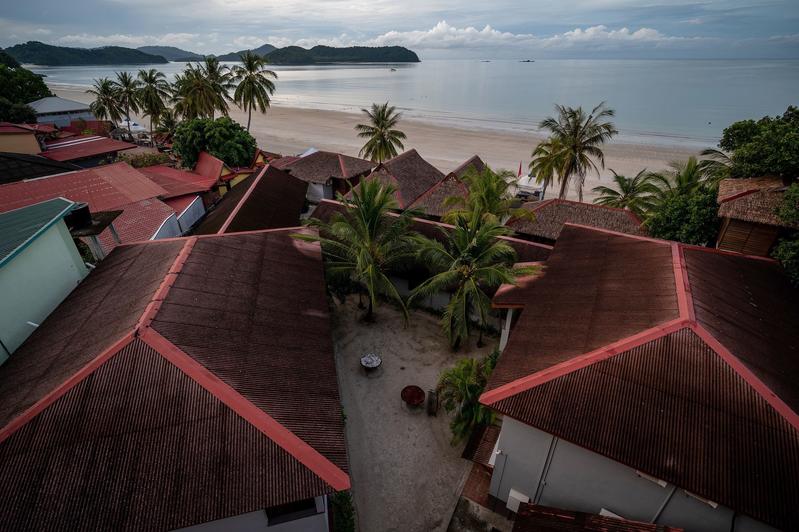 Island of Langkawi (MOHD RASFAN / AFP / GETTY IMAGES)
Island of Langkawi (MOHD RASFAN / AFP / GETTY IMAGES)
WELLINGTON / MELBOURNE / TOKYO / KUALA LUMPUR / JERUSALEM / TEHRAN / BANGKOK / PHNOM PENH / MANILA / SEOUL / SINGAPORE / NEW DELHI - Malaysia will reopen the tourist haven of Langkawi islands to overseas visitors beginning Nov 15, under a pilot international tourism bubble project that will run for three months.
The government has approved protocols for international tourists to enter the islands without having to quarantine, Prime Minister Ismail Sabri Yaakob said in a statement on Friday. Visitors must be “high-yield”, fully vaccinated, and stay for at least three days, among other requirements.
Malaysia will evaluate the pilot project before emulating it in other tourist destinations throughout the country, Ismail added.
The Southeast Asian nation is following in the footsteps of neighboring countries such as Thailand and Singapore in easing quarantine rules for inoculated visitors, as the region seeks to recover from the global pandemic. Tight movement restrictions for most of the year tipped Malaysia’s gross domestic product into a quarterly contraction during April-June.
Malaysia’s speedy vaccine rollout in recent months has helped the country turn a corner. The states of Terengganu and Johor will transition to the final phase of the national recovery plan from Monday, joining Kuala Lumpur and Selangor, Ismail said.
The government also approved rules for allowing migrant workers to re-enter Malaysia on a case-by-case basis, he said.
Malaysia reported another 6,210 new COVID-19 infections as of midnight Thursday, bringing the national total to 2,413,592, according to the health ministry.
Some 42 of the new cases are imported, with 6,168 being local transmissions, data released on the ministry's website showed.
Another 96 more deaths have been reported, bringing the death toll to 28,234.
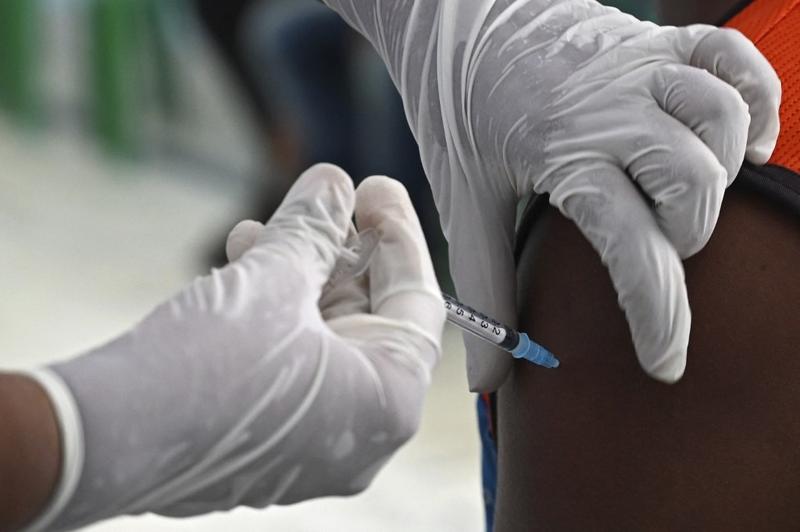 A health worker inoculates a person with a dose of the Covid-19 coronavirus vaccine at a health clinic in Kolkata on Oct 21, 2021. (DIBYANGSHU SARKAR / AFP)
A health worker inoculates a person with a dose of the Covid-19 coronavirus vaccine at a health clinic in Kolkata on Oct 21, 2021. (DIBYANGSHU SARKAR / AFP)
APEC
Finance ministers from Asia-Pacific trade group APEC met on Friday and agreed to step up efforts to expand COVID-19 vaccine manufacture and supply, and support global vaccine sharing, host nation New Zealand said in a statement.
The ministers agreed to use all available policy tools to address COVID-19 and said they would maintain macroeconomic and financial stability and refrain from competitive exchange rate devaluations.
Despite a sharp drop in infections and rising vaccinations in wealthy APEC nations, there are concerns that few shots have reached smaller, poorer countries where the virus still rages. The World Health Organization has spoken about the risks and inequality of such "vaccine apartheid".
The 21-economy group, which includes the United States, China and Japan, also acknowledged divergence in recovery from the pandemic as groups such as women and indigenous people continue to be disproportionately impacted.
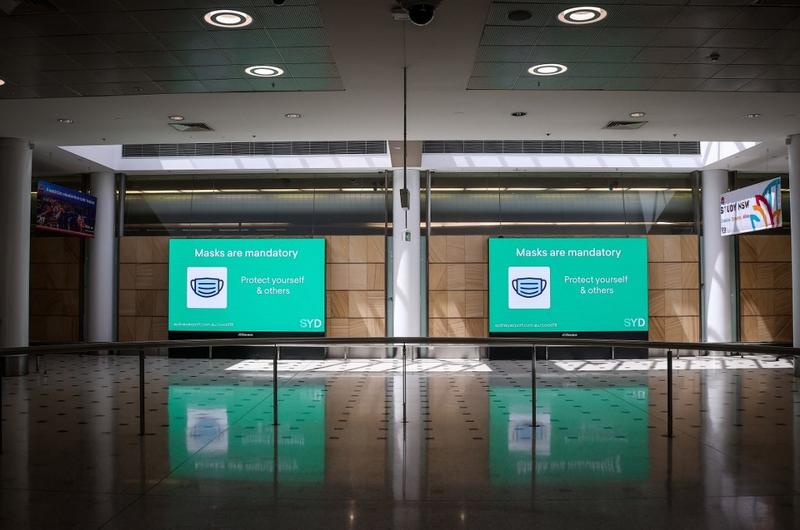 Electronic signs display COVID-19 face mask requirements inside the empty arrivals hall at the international airport in Sydney on Oct 15, 2021. (DAVID GRAY / AFP)
Electronic signs display COVID-19 face mask requirements inside the empty arrivals hall at the international airport in Sydney on Oct 15, 2021. (DAVID GRAY / AFP)
Australia
Melbourne residents flocked to the city's pubs, restaurants and hair salons in the early hours of Friday after the world's most locked-down city emerged from its latest spate of restrictions designed to combat the spread of COVID-19.
Australia's second-largest city has so far endured 262 days, or nearly nine months, of restrictions during six separate lockdowns since March 2020, representing the longest cumulative lockdown for any city in the world.
In Melbourne, people were seen cheering and clapping from their balconies, while cars honked horns continuously at 11:59 pm on Thursday when lockdown restrictions in place since early August ended.
Many venues, including food outlets and even haircutters, opened at the unusual hour for the occasion.
Just over 70 percent of adults in Australia are now fully vaccinated and many residents are planning to fly overseas again as international border restrictions start to ease from November.
From Nov 1, fully vaccinated international travelers arriving in Sydney and Melbourne will no longer need to quarantine. Other cities have flagged similar plans as vaccination rates rise.
Cambodia
Cambodia's Ministry of Education on Thursday gave a green light to primary schools and kindergartens at the areas where COVID-19 is controllable, to reopen after most of the targeted population have been inoculated against COVID-19, according to Khmer Times's report on Friday.
Education Minister Hang Chuon Naron said in a statement that fully vaccinated teachers and students are given priority to return to in-person classes, while teachers, who are older than 50, should continue teaching online.
He said schools that have met the Standard Operating Procedures can reopen from Nov 1.
The minister said the latest move came after the Southeast Asian nation has achieved high COVID-19 vaccination rates and has seen a significant drop in new COVID-19 cases in recent months.
Secondary and high schools, as well as universities, have been reopened since last month.
ALSO READ: Israel to readmit vaccinated foreign tourists next month
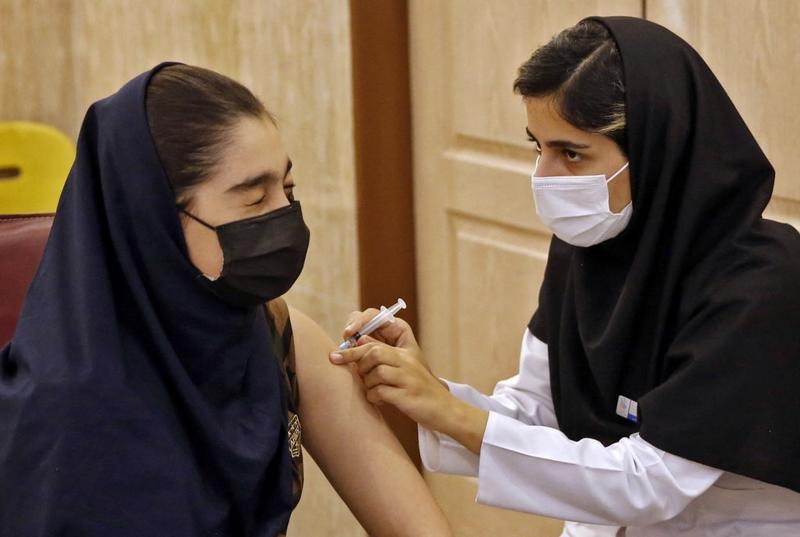 A student reacts as she receives a COVID-19 coronavirus vaccine dose at a vaccination center set up inside a school in Iran's capital Tehran on Oct 7, 2021. (PHOTO / AFP)
A student reacts as she receives a COVID-19 coronavirus vaccine dose at a vaccination center set up inside a school in Iran's capital Tehran on Oct 7, 2021. (PHOTO / AFP)
Iran
The Iranian health ministry reported on Thursday 11,788 new COVID-19 cases, taking the country's total infections to 5,833,525.
According to an official briefing published on the ministry's official website, the pandemic has claimed 124,763 lives in the country so far, after 178 new deaths were registered in the past 24 hours.
A total of 5,375,475 people have recovered from the disease or been discharged from hospitals across the country, while 4,486 remain in intensive care units, the ministry said on its official website.
India
Tens of millions of Indian adults are unlikely to be fully vaccinated against COVID-19 by the end of 2021, despite ample supplies, due to an unusually large gap between the doses of the most widely-used vaccine and growing complacency as cases fall.
The locally-produced AstraZeneca vaccine which is known as Covishield has a 12 to 16 week gap between doses, in contrast to the 8 to 12 week gap recommended by the World Health Organization.
Based on current trends, the Covishield dosage gap means more than 200 million people will be eligible for their second dose only in late January even if all of them were to get their first shot on Friday.
Meanwhile, people are growing increasingly complacent about getting inoculated as infections and deaths have fallen sharply in the past month. The government wants to vaccinate all of the country's 944 million adults by December but some 230 million of them have yet to get even a single dose.
Serum Institute of India, which produces Covishield, has nearly quadrupled its capacity since April and can now produce up to 240 million vaccine doses monthly.
But health experts are not too worried about the fact that many people will not get their second doses in 2021, even though they say it would be safer for the population to be fully inoculated as soon as possible.
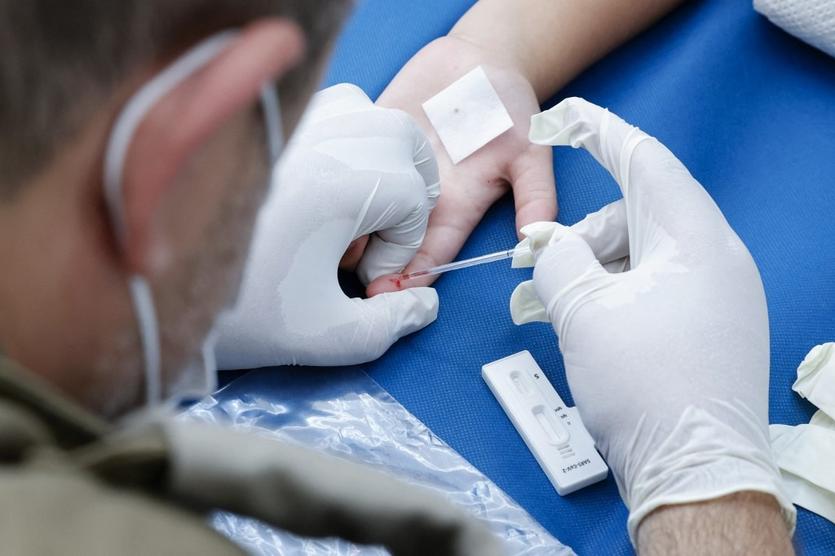 In this file photo taken on Aug 22, 2021, an Israeli child undergoes COVID-19 antibody testing in the coastal city of Netanya, before the start of the new school year. (JACK GUEZ / AFP)
In this file photo taken on Aug 22, 2021, an Israeli child undergoes COVID-19 antibody testing in the coastal city of Netanya, before the start of the new school year. (JACK GUEZ / AFP)
Israel
Israel would be reopened next month to tourists fully vaccinated against COVID-19, according to a plan jointly drafted by Prime Minister Naftali Bennett's office and tourism and health ministries.
Under the plan, individual tourists who are fully inoculated with vaccines produced by Pfizer, Moderna, AstraZeneca, Johnson & Johnson, Sinovac, and Sinopharm may enter Israel starting from Nov 1, the prime minister's office said in a statement.
People who have recently recovered from COVID-19 would also be allowed to enter the country if they had received a booster dose of a vaccine approved by the World Health Organization, the statement said.
The plan is subjected to updates "according to developments and the discovery of new variants," and will be brought for final approval of the cabinet later in October, it added.
Meanwhie, five more cases of the new COVID-19 Delta variant "AY4.2" were reported by Israel's Ministry of Health on Thursday.
The first case of the variant in Israel was detected on Tuesday in an 11-year-old boy who returned from Moldova and was tested positive at Ben Gurion Airport outside Tel Aviv.
Upon the detection of the variant in the boy, the ministry's genetic sequencing laboratory reviewed all sequences that were classified as the Delta variant so far, given the AY4.2 variant had been classified all over the world as the Delta variant and only recently was classified as a separate variant.
As a result of the repeat review, five additional previous cases meeting the new classification's requirements have been detected.
The ministry also reported 1,025 new COVID-19 cases in Israel, bringing the total tally of infections in the country to 1,320,884.
ALSO READ: Thailand to allow quarantine-free travel from Hong Kong
Japan
The local governments in Japan's Tokyo and Osaka have planned to lift COVID-19 restrictions on restaurants and bars next week in light of declining infections across the country.
Restrictions on eateries serving alcohol or operating hours will no longer be in place starting on Monday, though there are concerns about a potential sixth wave of infections in winter, the local governments' said on Thursday.
The metropolitan government of Tokyo plans to continue limiting the number of people who can sit at the same table to four.
However, five or more people will be allowed to eat together if they present proof of COVID-19 vaccinations.
The prefectural government of Osaka will also continue to limit the number of people eating together in restaurants to four until the end of November. It also called on the public to refrain from dining for more than two hours.
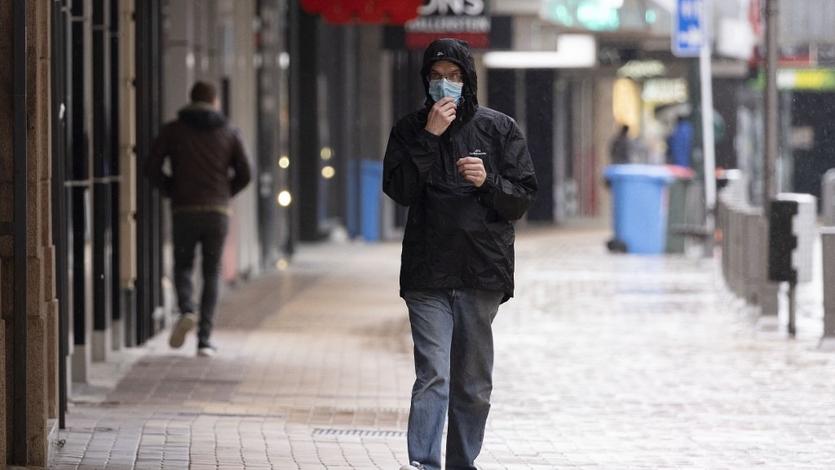 A man wearing a face mask walks on a street during a nationwide COVID-19 lockdown in Wellington on Aug 18, 2021.(MARTY / MELVILLE / AFP)
A man wearing a face mask walks on a street during a nationwide COVID-19 lockdown in Wellington on Aug 18, 2021.(MARTY / MELVILLE / AFP)
New Zealand
New Zealand will end its strict coronavirus lockdown measures and restore more freedoms only when 90 percent of its eligible population is fully vaccinated, Prime Minister Jacinda Ardern said on Friday.
Once the poster child for stamping out COVID-19, New Zealand has been unable to beat an outbreak of the highly infectious Delta variant of COVID-19 centered in Auckland, forcing Ardern to abandon her elimination strategy and switch to living with the virus.
Ardern said reaching a 90 percent inoculation rate at every District Health Board in the country would make the South Pacific nation one of the most vaccinated countries in the world. Some 68 percent of eligible New Zealanders are fully vaccinated and 86 percent have had one dose.
When the vaccine target is reached, the country will move into a new traffic-light system to manage outbreaks in regions.
Vaccine certificate will be central to the new system, which will also use three settings - green, orange and red - to manage fresh outbreaks and cases, Ardern said.
New Zealand reported a record 129 COVID-19 cases on Friday, a daily record for the third time this week, despite Auckland remaining in lockdown for over two months. Looser restrictions are in place in most of the rest of the country of 5 million.
Philippines
The Philippines' Department of Health reported 5,823 new COVID-19 infections on Friday, pushing the number of confirmed cases in the Southeast Asian country to 2,745,889.
The DOH also reported that 283 more people died from COVID-19 complications, bringing the death toll to 41,520.
The Philippines, which has around 110 million population, has tested more than 21 million people since the outbreak in January 2020.
Singapore
Few are left to inoculate in wealthy Singapore after a vigorous campaign achieved a level of coverage envied by many nations battling the coronavirus pandemic, but a record surge in deaths and infections gives warning of risks that may still lie ahead.
Despite mask mandates, strict social curbs and COVID-19 booster doses available for over a month, infections in the Asian city-state's latest outbreak, driven by the Delta variant, took the death toll to 280, up from 55 early in September.
Now Singapore is slowly re-opening its borders, expanding quarantine-free travel to nearly a dozen countries.
Although 84 percent of Singapore residents have been fully vaccinated, most with doses from Pfizer/BioNTech or Moderna, the vaccines may not protect some of the most vulnerable.
Fully vaccinated people made up about 30 percent of deaths over the last month, most older than 60 with underlying medical woes, in line with studies showing that vaccines offer less protection to the old and very ill.
Following an easing of curbs in August, Singapore's latest wave has led to daily infections this week of nearly 4,000, or nearly three times higher than last year's peak.
Singapore will extend some of its social-distancing curbs for about a month to ease pressure on the healthcare system, authorities said this week.
ALSO READ: Singapore extends virus curbs for month as ICU beds fill up
South Korea
South Korea reported 1,440 more cases of COVID-19 as of midnight Thursday compared to 24 hours ago, raising the total number of infections to 348,969.
The daily caseload was almost unchanged from the previous day, hovering above 1,000 for 108 straight days since July 7. The daily average tally for the past week was 1,373.
The recent resurgence was attributable to cluster infections in the Seoul metropolitan area.
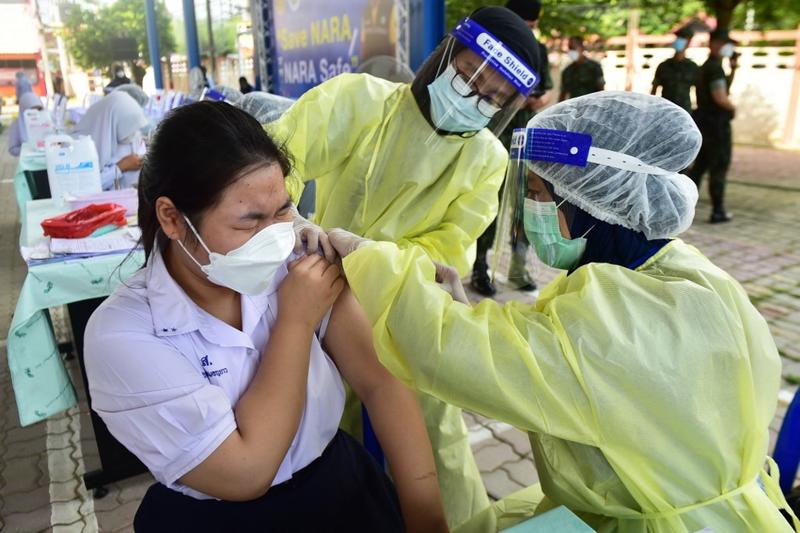 A student receives a dose of the Pfizer/BioNTech COVID-19 coronavirus vaccine at the Narasikalai school in the southern province of Narathiwat on Oct 15, 2021. (MADAREE TOHLALA / AFP)
A student receives a dose of the Pfizer/BioNTech COVID-19 coronavirus vaccine at the Narasikalai school in the southern province of Narathiwat on Oct 15, 2021. (MADAREE TOHLALA / AFP)
Thailand
Thailand announced late Thursday that it will allow vaccinated visitors from 46 low-risk countries and regions to enter Thailand without quarantine from November.
The list, which includes China, the United States, Britain and Malaysia, was released by Thailand's Ministry of Foreign Affairs.
Beginning Nov 1, the eligible travelers will be allowed to travel freely in Thailand once they pass their post-arrival COVID-19 test, according to MFA spokesman Tanee Sangrat.
The announcement came after Thai Prime Minister Prayut Chan-o-cha said last week that the country would initially allow vaccinated travelers from at least 10 low-risk countries and regions to enter by air without quarantine requirements from next month.
Thailand is beefing up efforts to revive its economy as the tourism sector, the main growth engine that contributed roughly 20 percent of the country's GDP before COVID-19, has been hit hard by the pandemic.


